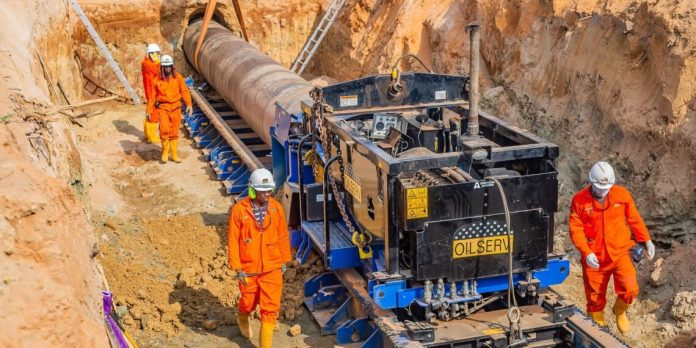The Nigerian National Petroleum Company Limited (NNPC Ltd) has successfully completed the challenging River Niger crossing segment of the Ajaokuta-Kaduna-Kano (AKK) Gas Pipeline Project, signaling a major leap forward in the country’s energy infrastructure.
The announcement was made by NNPCL’s Group Chief Executive Officer, Mr. Bayo Ojulari, during his keynote address at the Nigeria Oil and Gas Energy Week Conference in Abuja—his first major industry speech since being appointed by President Bola Tinubu.
Describing the River Niger crossing as the most technically complex portion of the project, Ojulari said its completion clears the path for the pipeline’s full delivery by the end of 2025. The AKK pipeline, a 614-kilometre, 40-inch wide gas corridor, is expected to transport natural gas from Ajaokuta in Kogi State to Kano, feeding multiple industrial zones and power stations en route.
“By God’s grace, before the end of the year, we will complete the pipeline connections and feed all the target markets. The economic impact will be far-reaching,” Ojulari said.
He also announced a major milestone in national infrastructure security, revealing that as of June 29, 2025, Nigeria had achieved 100% pipeline availability—a dramatic turnaround from years of pipeline sabotage and crude theft.
“For years, this conference was a place of lament over pipeline vandalism. Today, I can confidently say those pipelines are fully operational, thanks to government efforts, military support, and collaboration across the industry,” he said.
Despite the progress, Ojulari highlighted that oil production remains below capacity, averaging just 1.35 million barrels per day (1.6 million including condensates). He attributed the lag to years of underinvestment and stressed the urgency of attracting new capital.
“We’ve resolved the infrastructure challenges. The question now is—where is the production? The stars are beginning to align, and this is the time to act,” he urged, calling on both local and international investors to seize the opportunity in Nigeria’s revitalized oil and gas sector.
The AKK pipeline is central to Nigeria’s strategy for domestic gas utilization, job creation, and power generation, especially in the country’s northern region.

